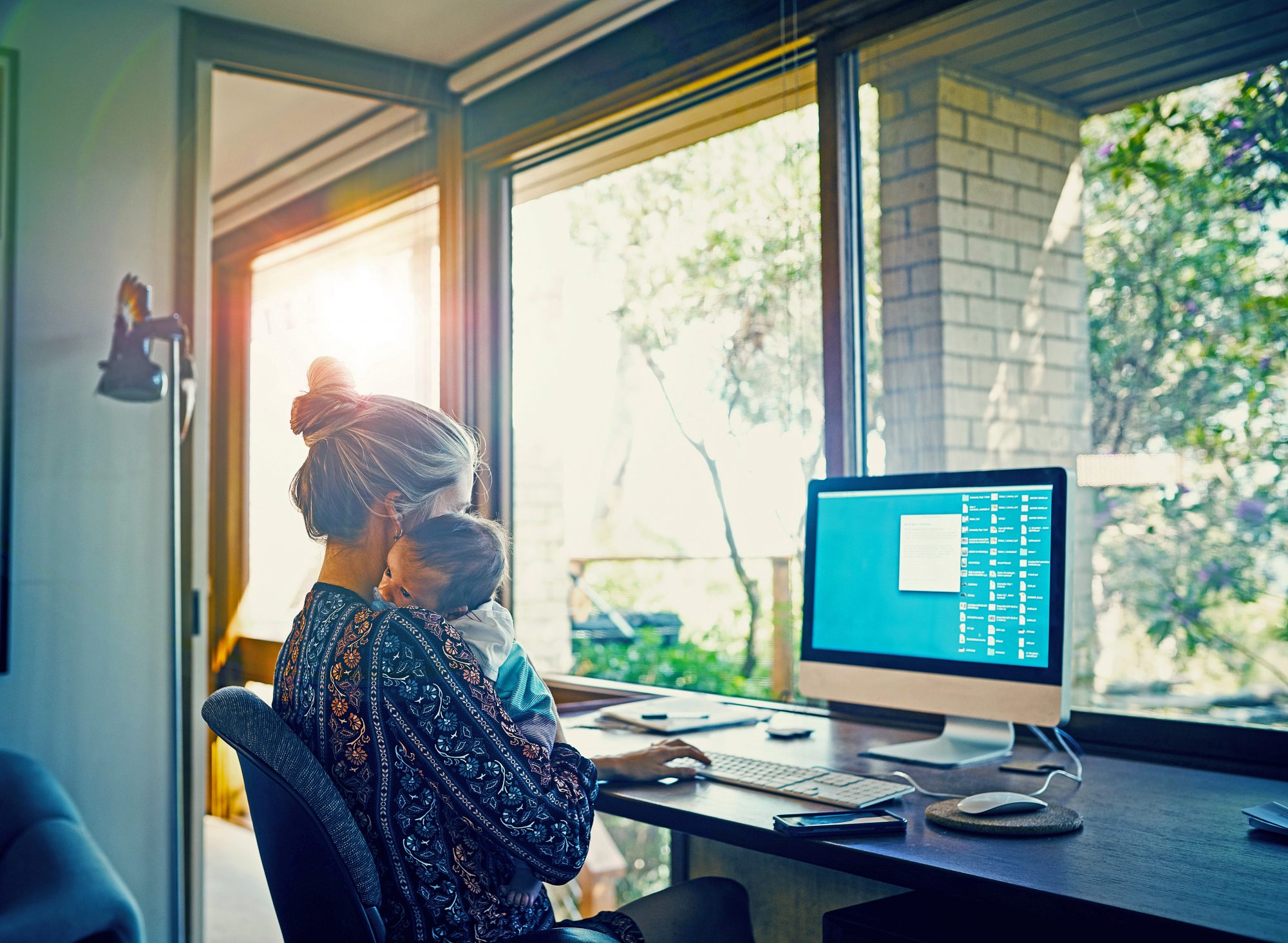
When the COVID-19 pandemic struck, medical care pivoted. One big change: Many major medical organizations—including the Centers for Disease Control and Prevention (CDC) and the American College of Obstetricians and Gynecologists (ACOG)—encouraged the use of telehealth, a practice that hasn't exactly been commonplace for the care of soon-to-be and new moms.
Today? Hospital systems, doulas, lactation consultants, physical therapists, and pretty much every other perinatal health professional you can think of has brought their services online. And while some women in some parts of the country are returning to in-person care, virtual appointments have become somewhat of a mainstay.
And sure, logging on to get the care you need has its perks—one of the biggest, perhaps, being that seeing a provider by way of a screen can lower the barriers to care, research finds. No lactation consultants in your area? No problem; meet with one on Zoom.
Of course, there are setbacks, too. The connection isn't as strong—via Wi-Fi or humans—physical follow-up care can be compromised, and women can fall through the cracks. After all, in order to access virtual care, you have to be able to access technology and the internet—luxuries that are far from givens.
But if you're curious what postpartum telehealth looks like right now, who better to share than new moms who have been there? Here, five women share their experiences with physical follow-up care, lactation services, and therapy—and experts provide insight for making the most of your time with a provider.
Virtual Postpartum Obstetrics Follow-up Care
Liz Elliott, a 37-year-old mom of one from Chicago who gave birth via C-section in the midst of the pandemic, notes that her postpartum follow-up appointment was by phone—and that she was highly disappointed with it. "After my emergency C-section and discharge, I hadn't seen or spoken to a doctor and so much was happening to my body. I couldn't even look at myself in the mirror without staring at my new scar and was still scared to face forward in the shower and let the water run over it."
When it came time for her video follow-up call, she notes that her doctor called her instead and seemed disinterested in her concerns. "The entire call lasted eight minutes. I cried after I got off alone in my bedroom, next to the video chat screen that wasn't used. I felt so alone."
Today, Elliott is in physical therapy healing pelvic floor issues and feels as though an in-person six-week follow-up appointment would have been better for her.
Arden Cartrette, a mom to one in Pittsboro, North Carolina, and a blogger at Hello Warrior, a site that provides an honest take on all things fertility, utilized telehealth to connect with her physician postpartum, too. She says that it felt like the appointments were quicker than before—"almost like bedside manner no longer existed but not by any fault of the doctor, it's just how virtual appointments can go."
Mariana Ramos Vidal, a mom in Canada who gave birth in August notes that, normally, a nurse from a local clinic is dispatched to do a house call postpartum to weigh the baby, assess you, and help with any breastfeeding issues. "Currently, these house calls have been suspended and have instead been replaced by a phone call," she says. "The phone conversation I had with the nurse was fruitful, but it did not replace the in-person help that I would have otherwise received."
Vidal also says that she was seen in person by her midwives. "Because my midwife came to visit us, I walked away with almost everything I needed. In that sense, I consider myself very lucky."
Overall, she says the virtual services she received were helpful and supportive, but not the same as in-person care.
What the expert says:
"Virtual visits allow you to see a physician or midwife without having to leave your home, but one of the biggest downsides is that they don't allow for a physical exam.
If you're having pain that you feel isn't normal for where you are in your postpartum journey, ask to be seen in person. The same goes for heavy bleeding or anything that makes you feel concerned.
Writing down all of the questions you have for your doctor and having them ready can help optimize a virtual appointment, as can being as open and honest as possible," says Heather Irobunda, M.D., a board-certified OB-GYN in New York.
Virtual Lactation Consultants
A lactation consultant might not be the first kind of practitioner that you think you'd see virtually, but on-the-screen visits with one can actually be quite effective.
While studies are limited, some research has found that telelactation services are often linked with high levels of satisfaction. One small study of 10 moms who saw lactation consultants via video even found that all of the women were comfortable talking about breastfeeding via video. A bigger study found that weekly phone support was also linked with a continuation of breastfeeding.
"My experience meeting with lactation consultants over Zoom was fantastic," says Christy B., a mom of one in Boston. "As a new mom, leaving the house feels like driving a car to the moon, and knowing I could get virtual lactation support from my couch was the biggest relief and eliminated a lot of pressure."
Christy notes that while some of lactation support relates to latch and positioning, for her, so much of it was logistics around understanding how and when to feed the baby. "I was amazed about how I could get great directions on how to adjust my latch even over Zoom. Unlike in the hospital where it is very hands-on, the virtual experience encouraged me to figure it out myself while listening to her guidance."
Cartrette, who also saw a lactation consultant virtually, notes that while she did enjoy being in the comfort of her own home, she felt a connection lag. "She had to go off of me explaining the way my breast felt, and my lack of knowledge compared to hers made it difficult for me to actually feel supported at the end of the visit," she says.
What the expert says:
"Whether I'm doing an in-person or virtual visit, I try to first practice hands-off anyway, so that I can observe a mom's natural breastfeeding experience and talk her through what changes might help. This is easy to translate to the screen, where all of my work is done today.
With virtual visits, you can also avoid the hassle of cleaning up your home or getting ready and clients often feel more relaxed, comfortable, and at ease. You have the opportunity to find a very skilled consultant who is anywhere on the planet, too.
Our society is still in the transition from being in-person to mostly virtual. COVID-19 has forced us to quickly adapt to this way of communicating, but it can be a bit of an adjustment for those of us who feel they will miss the warmth of close social interactions. It will take a bit more time and effort to find a consultant who has enough experience and is highly skilled at virtual consultations, yet the benefits of the effort cannot be overstated," says Andrea Syms-Brown, IBCLC, a Robyn provider and founder of Baby in the Family.
Virtual Therapy
About half of adults in the U.S. report that their mental health has declined due to anxiety around both the COVID-19 pandemic and economic worries. New moms? They're even more vulnerable to setbacks—a fact that makes the need for virtual therapy paramount.
Many women enjoy the convenience of meeting with a mental health professional from the comfort of their home. (To find a therapist who specializes in perinatal mental health, visit Postpartum Support International's online provider directory.)
"I feel less anxious about the actual act of going to therapy," says Cartrette. "Having the ability to do virtual therapy and still be on my insurance coverage plan has been really nice. It's really taken the anxiety of actually going to therapy and made it more attainable and comfortable for introverts especially."
Lauren Good, a 33-year-old mom to a 1-and-a-half-year-old in New York has also had a positive experience. "When I went back to my full-time job, I felt a great sense of unease, sadness, anxiety, and lack of identity. I could not seem to reconcile who I was before I became a mother and who I was now that I was so deeply in love with my daughter," she says. "I started seeing my amazing therapist at Octave and she helped me learn coping mechanisms to deal with my strange and difficult feelings. I don't feel that having to do virtual sessions because of the pandemic has hindered the experience in any way."
Of course, the practice isn't without flaws. "I had a neutral experience with virtual therapy because it's simply hard to develop trust and a bond with somebody on Zoom who you have never met before," says Christy. "While I found it important to have a space to unpack my new motherhood thoughts every week, I didn't find the experience as rewarding as the in-person therapy sessions I have had throughout my life."
What the expert says:
"Being able to meet people where they're at in their own home is a huge benefit to virtual therapy. It makes therapy a lot more accessible, especially if you have one or more children.
Therapists are also able to see you in your environment—where you're sitting or a partner walking by, for example. For a clinician, these are windows to look into the life of the person sitting in front of us.
I also think the fear of judgment from others is ever so slightly muted on a screen as opposed to in-person. Whether we like it or not, we are hardwired to compare ourselves to others and I think it's a lot less room for that on the screen. This can open up the lines of communication more.
Face-to-face is always better in my opinion. You get to see the experience and the entire person; you feel like you're having more of a connection in human interaction with someone. But this is not a forever thing—and it's much better to get the support and treatment you need than not to get it at all," says Paige Bellenbaum, LCSW, founding director at The Motherhood Center.





